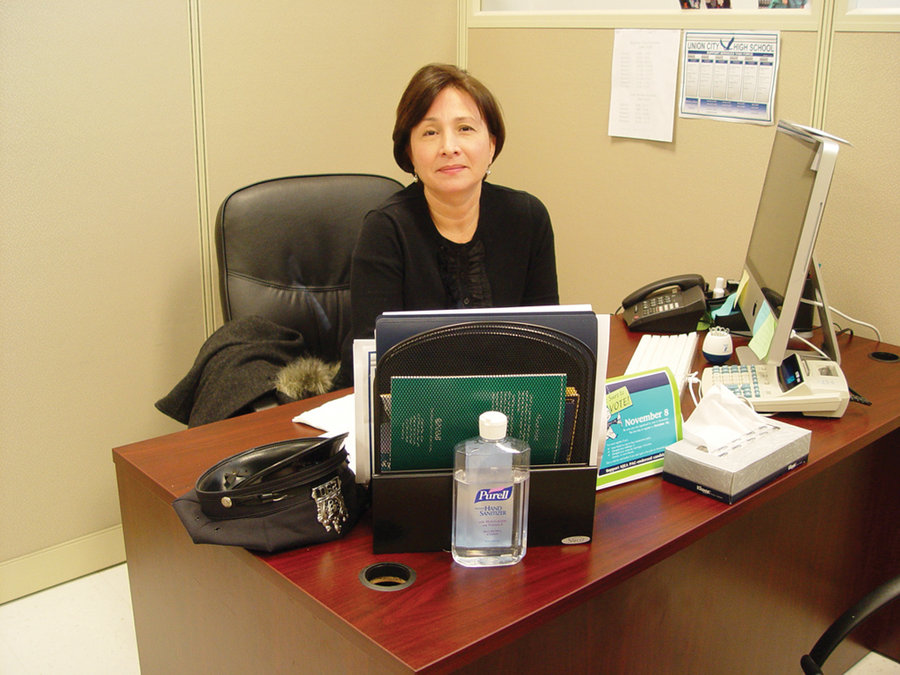Union City was identified as the most densely-populated city in New Jersey in 2010, with 66,455 residents living in an area of only 1.27 square miles, according to the U.S. Census Bureau. Union City High School houses over 2,000 students, and that doesn’t include freshmen.
Things have improved since two high schools, Union Hill and Emerson, were merged and moved into the new facility a few years ago, according to School Based Youth Services Program (SBYSP) Director Nivia Rojas. But such a large population can be intimidating for many students, and it is easy for those with social adaptation issues to get lost in the crowd.
This is where SBYSP, or “School Based” for short, comes in.
They make you feel comfortable, and I like it.” – Dania Hernandez
____________
The high school has two separate offices for the program. The first-floor-office serves 900 students and the second floor serves 1,500.
Other schools in the district can use the program as well. Jose Martí Freshman Academy has around 400 students that use the program, and Union Hill Middle School has around 400 as well. There is no program in Emerson Middle School thus far, but Rojas plans to apply for another grant as soon as it becomes available.
She said obtaining youth services early (for which students must get parental consent) is vital for their transition between schools, and helps them with more serious pressures.
One-stop shopping for social services
School Based provides mental health services, recreational activities, and family counseling. Other programs operate under their umbrella.
When children have a difficult time in school – disagreements with teachers or with members of the administration, for instance – one facet of the program provides student advocacy that falls in line with the appropriate state educational guidelines.
“We serve as their lawyers, in a sense, to negotiate, on behalf of the students, with the guidance counselors or the administration so that we can work out a plan that is mutually beneficial,” Rojas said.
The School Based offices themselves serve as a drop-in refuge for students during the day, and lend a safe haven to those who feel uncomfortable in such a densely-populated school environment. Students can talk to social workers, take a “break” from their hectic schedule, and even eat lunch with the staff if the cafeteria proves too socially daunting.
The School Based staff often teaches workshops in classrooms that address such teen-related topics as pregnancy prevention, life skills, substance abuse, and healthy and unhealthy dating relationships.
Because student issues often affect or include their families, the program offers family counseling. The family counseling is offered alongside a variety of after-school programs such as tutoring, grief counseling, employment skills (where students learn how to fill out applications and write resumes), and dance classes, to name a few.
For teens who find themselves pregnant, there is the Parent Linking Program – a daycare center located in the high school itself.
“The purpose for that program,” Rojas said, “is to give the teen mother the opportunity to finish her education so that she’ll be able to better provide for her child in the future.”
There are strict guidelines for the program. For instance, it only serves one pregnancy.
Positive feedback
Daniela LaMancha is a junior at the high school who has been a member of School Based for two years. She works closely with social worker Andrea Tores, who has managed to bring Daniela back into the program after her attendance declined over the past year because of personal issues.
“Aside from talking to me and counseling me, Ms. Tores is really a friend to me,” Daniela said.
Daniela comes to the upstairs office to do homework, eat lunch, and “just chill.”
“I feel calm here,” she said. “They just let you be.”
Daniela wants to study psychology, in part because of the impact School Based has had on her life. “I like talking to people – you know, being able to help somebody when they have a problem.”
Senior Dania Hernandez joined the program a year ago after a friend recommended it to her.
“They treat me like family,” she said. “They make you feel comfortable, and I like it.”
Tores, who lives in Union City, is a former Division of Youth and Family Services social worker who joined the program in 2002. “Each time I see a student make a positive choice, I feel like, yes!” she said.
For more information, visit www.nj.gov/dcf/prevention/school or call (609) 984-5516.
Gennarose Pope may be reached at gpope@hudsonreporter.com
